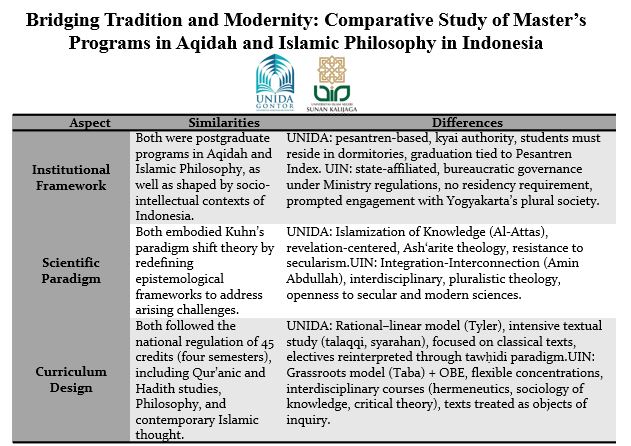Bridging Tradition and Modernity:Comparative Study of Master’s Programs in Aqidah and Islamic Philosophy in Indonesia
Abstract
 Abstract Views: 0
Abstract Views: 0
This study provides a comparative investigation of the Master’s Programs in Aqidah and Islamic Philosophy in Indonesia, focusing on Darussalam University (UNIDA) Gontor and Sunan Kalijaga State Islamic University (UIN Sunan Kalijaga). The study examines how institutional frameworks, epistemological paradigms, and curriculum design shape the development of scholarship in these institutions. A qualitative comparative approach was employed, combining document analysis, semi-structured interviews with faculty and students, and field observations conducted in 2023, complemented by desk research in 2024–2025. The analysis used institutional theory, Kuhn’s paradigm concept, and curriculum design perspectives. The results showed distinct orientations alongside areas of convergence. UNIDA represented a pesantren-based model grounded in moral-spiritual authority and a tawḥīdic worldview, which outlined Islamization of knowledge and classical epistemology preservation. UIN reflected a state-affiliated model influenced by bureaucratic governance and accreditation demands. It advanced the integration–interconnection paradigm that promoted interdisciplinary dialogue and openness to contemporary scholarship. Curriculum practices reinforced these approaches with UNIDA adopting a rational-linear model centered on textual mastery. While UIN applied flexible frameworks which integrated hermeneutics, critical theory, and multidisciplinary methods. These models exhibited the richness of Indonesian Islamic higher education in negotiating tradition and modernity. UNIDA safeguarded epistemological continuity rooted in revelation, with UIN concentrated on adaptability and global engagement. These insights provided meaningful implications for policymakers and educators in designing Islamic higher education that was contextually grounded, epistemologically coherent, and responsive to global academic currents.
Downloads
References
Abdullah, Amin. “Islamic Studies in Higher Education in Indonesia: Challenges, Impact and Prospects for the World Community.” Al-Jami’ah: Journal of Islamic Studies 55, no. 2 (2017): 391–426, https://doi.org/10.14421/ajis.2017.552.391-426.
—. Islamic Studies in the Paradigm of Integration--Interconnection: An Anthology. Yogyakarta: Suka Press, 2007.
Ornstein, Allan C., and Francis P. Hunkins. Curriculum: Foundations, Principles, and Issues. 2nd ed. Needham Heights, MA: Allyn and Bacon, 1993.
Amrullah, Khasib., Usmanul Khakim, Sofian Hadi, and Ahmad Sidik. “From the Liberation of the Soul to the Islamization of Knowledge (Interpreting the Thought of Al-Attas).” Kalimah: Journal of Religious Studies and Islamic Thought 19, no. 2 (2021): 280–295, https://doi.org/10.21111/klm.v19i2.6655.
Arifin, Muh, Fauzi, et al. “The Intellectual Genealogy of Darussalam Gontor Islamic Boarding School and Al-Azhar University, Cairo.” TADRIS: Journal of Islamic Education 16 (2021): 351–363. https://doi.org/10.19105/tjpi.v16i2.4836.
Al-Attas, Syed Muhammad Naquib. Islam and Secularism. Comparative Secularisms in a Global Age. Kuala Lumpur: International Institute of Islamic Thought and Civilization (ISTAC), 1995. https://doi.org/10.1057/9780230106703.
Berger, Peter L, and Thomas Luckmann. The Social Construction of Reality: A Treatise in the Sociology of Knowledge. New York: Anchor Books, 1966.
Directorate of Pesantren Affairs. Manual Book: Integrated Pesantren Achievement Index (IPKs) Assessment System. Ponorogo, 2021.
Al-Faruqi, Ismail R. Islamization of Knowledge: General Principles and Work Plan. Herndon: IIIT, 1982.
Hamruni, et al. “Transformation of Islamic Religious Institutes (IAIN) Become Islamic University (UIN) In the Ministry Of Religion, Indonesia.” American Research Journal of Humanities & Social Science 3, no. 12 (2020): 54–59.
Hayadin, et al. “Contemporary Changes in Islamic Higher Education in Indonesia: Dynamic Encounter Between Modernisation and Tradition.” Journal of Al-Tamaddun 20, no. 1 (2025): 189–200, https://doi.org/10.22452/jat.vol20no1.14.
Izudin, Ahmad. “Applying the Integration-Interconnection Paradigm in the Teaching and Learning Process of the Postgraduate Program at UIN Sunan Kalijaga Yogyakarta.” Afkaruna: Indonesian Interdisciplinary Journal of Islamic Studies 13 (2017): 110–140, https://doi.org/10.18196/AIIJIS.2017.0069.110-140.
Kuhn, Thomas. The Structure of Scientific Revolutions. Chicago: The University of Chicago Press, 1970.
Lubis, M. Iqbal, Ilyas Husti, and Bisri Mustofa. "Implementasi Konsep Integrasi Islam dan Sains UIN Sunan Kalijaga Yogyakarta." At-Tarbiyah Al-Mustamirrah: Jurnal Pendidikan Islam 4, no. 1 (2023): 15–28, https://doi.org/10.31958/atjpi.v4i1.8605.
Ministry of Education and Culture. National Standard for Higher Education (SN-Dikti). Jakarta: Directorate General of Higher Education, 2020.
Muslih, Mohammad, et al. “An In-Depth Analyisi of Al Faruqi’s Theory of Islamization of Knowledge: A Perspective from Thomas Kuhn’s Paradigm Shift Theory.” Hamdard Islamicus 47, no. 1 (2024): 27–49, https://doi.org/10.57144/hi.v47i1.436.
Powell, Walter W., and Paul J DiMaggio, eds. The New Institutionalism in Organizational Analysis. Chicago: University of Chicago Press, 1991.
Rahmawati, Fitri, et al. “Adab and Akhlaq in the Islamic Scientific Tradition: Reflection on Curriculum at UNIDA Gontor.” In Proceedings of the 1st International Conference on Business, Law and Pedagogy (ICBLP 2019), Sidoarjo, Indonesia, February 13–15, 2019, 1–6. EAI, 2019. http://dx.doi.org/10.4108/eai.13-2-2019.2286203.
Rao, N. J. “Outcome-Based Education: An Outline.” Higher Education for the Future 7, no. 1 (2020): 5–21, https://doi.org/10.1177/2347631119886418.
Scott, Richard W. Institutions and Organizations: Ideas, Interests, and Identities. 4th ed. Thousand Oaks, CA: Sage, 2014.
Stake, Robert E. The Art of Case Study Research. Thousand Oaks, CA: SAGE Publications, 1995.
Taba, Hilda. Curriculum Development; Theory and Practice. New York SE: Harcourt, Brace & World, 1962. https://worldcat.org/title/176063.
Thanh, Nguyen Cao, and T. T. Le Thanh. “The Interconnection between Interpretivist Paradigm and Qualitative Methods in Education.” American Journal of Educational Science 1, no. 2 (2015): 24–27.
Vivek, Ramakrishnan., et al. “Beyond Methods: Theoretical Underpinnings of Triangulation in Qualitative and Multi-Method Studies.” SEEU Review 18, no. 2 (2023): 105–22. https://doi.org/10.2478/seeur-2023-0088.
Wraga, William. “Understanding the Tyler Rationale: Basic Principles of Curriculum and Instruction in Historical Context.” Espacio, Tiempo y Educación 4 (2017): 227–252. https://doi.org/10.14516/ete.156.
Zarkasyi, Hamid Fahmy, et al. “Value Management in Pesantren-Based University (Grounded Research on AKPAM System of UNIDA Gontor).” QALAMUNA: Journal of Education, Social Studies, and Religion 15, no. 2 (2023): 113–1126. https://doi.org/10.37680/qalamuna.v15i2.4018.

Copyright (c) 2025 Muhammad Faishal, Amroeni Drajat, Ryandi, Sumarsih Anwar, Shiyamu Manurung, Saimroh, Nursalamah Siagian

This work is licensed under a Creative Commons Attribution 4.0 International License.

This work is licensed under a Creative Commons Attribution 4.0 International License. Authors retain copyright and grant the journal right of first publication with the work simultaneously licensed under a Creative Commons Attribution (CC-BY) 4.0 License that allows others to share the work with an acknowledgement of the work’s authorship and initial publication in this journal.







